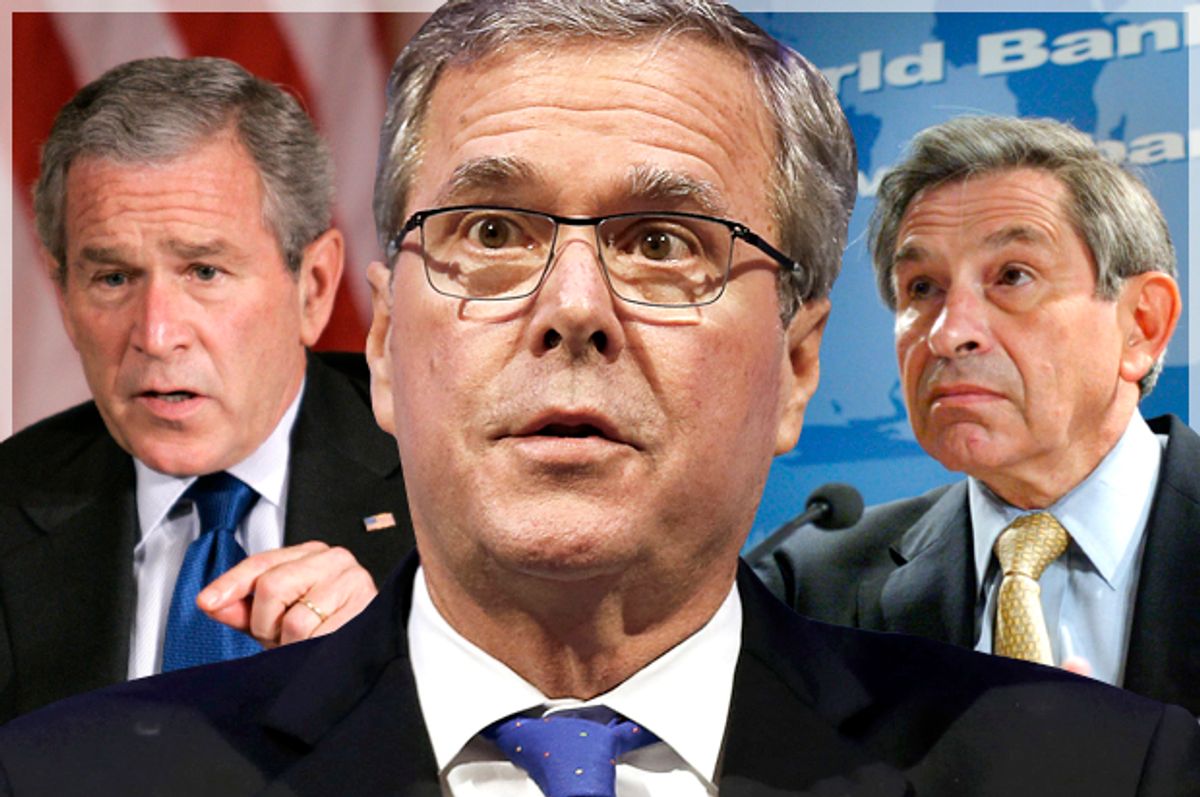It’s amusing to think back to February of this year and the speech Jeb Bush gave laying out his grand vision for foreign policy. Jeb was still pretending to be undecided on whether he would run for president at that point, but he wanted to head off any suggestion that he’d go down the same foreign policy path as his brother, who left office broadly despised for having launched a costly and unnecessary war in Iraq. “I am my own man,” Jeb promised in that speech, “and my views are shaped by my own thinking and own experiences.”
Since then he’s done just about everything he can to prove that statement false. The foreign policy doctrine he laid out in August was a reimagining of his brother’s worldview: send more U.S. troops to Iraq, send U.S. troops to Syria to help topple Assad and help set up “a stable, moderate government,” and bend the world to America’s will with copious demonstrations of “strength” and “leadership.” Jeb has spent the past two weeks stridently defending his brother’s national security record from Donald Trump’s Twitter trolling.
And, as the New Yorker’s Ryan Lizza writes, Jeb’s foreign policy retinue is comprised mainly of the same cranks and charlatans who populated Brother George’s national security team. Once-notorious Bush administration veterans you probably haven’t heard about or thought of in years – Paul Wolfowitz, Stephen Hadley, Porter Goss – are all signed on to Jeb’s campaign and guiding his thinking on foreign policy. If you thought the Iraq disaster had chased these guys from public life and left the Bush Doctrine on history’s ash heap, you were unfortunately mistaken.
And these guys are still true believers. Lizza spotlights one Jeb advisor in particular: Otto Reich, a veteran of both Bush administrations and the Reagan White House (he oversaw the latter administration’s pro-Contra propaganda efforts). Speaking to Lizza, Reich offered up one of the most morally repugnant and intellectually dishonest “defenses” of the Iraq war I’ve ever seen:
“I can defend the invasion of Iraq,” Reich told me. “What did the invasion of Iraq do? It caused all of the people who would’ve otherwise come and attacked us and killed Americans on our soil—it caused them to go to Iraq and die there. That may sound very brutal, or whatever, but we have seen what has happened when you have an Administration like the current one, that did not realize what Bush had done; sent the troops home from Iraq; created a vacuum that was filled by ISIS. And they’re killing Americans and everyone else—they’re mostly killing Muslims. I lay that at the feet of the Obama Administration.”
It’s hard to pinpoint the worst part of this “brutal, or whatever” rationale for the war. It’s true that the invasion turned Iraq into a magnet for terrorists, but they didn’t go to Iraq to “die there” – they went to kill Americans. Specifically, they went to kill American soldiers. So the justification he’s offering is that we had to send Americans to be killed to prevent Americans from being killed. The fact that many tens of thousands of Iraqi civilians also died as a consequence of the invasion and occupation doesn't seem to enter into his calculus. And, of course, drawing terrorists into the Iraq warzone provided them with a training ground and a cause to organize around. Intelligence agencies determined that the war had “helped spawn a new generation of Islamic radicalism” – Al Qaeda in Iraq, which did not exist before the invasion, eventually morphed into what became ISIS. So hey… great plan!
Also, the idea that Iraq drew all the terrorists in and prevented them from attacking elsewhere is a flagrant lie. Terrorist bombs blew up trains in Madrid in March 2004, and subways in London in July 2005. In the years following the invasion, the Bush administration tried to maintain a mood of constant, simmering fear by claiming that it used torture and mass surveillance to thwart countless numbers of terrorist plots against the U.S. No matter how you look at this “defense” of the war, it’s flatly dishonest and thoroughly monstrous.
And this guy is bending Jeb’s ear on foreign policy. He’s a die-hard supporter of the unquestionably disastrous foreign policy decisions of Jeb’s brother. And Jeb’s foreign policy, while painfully vague, tracks nicely with the contours of the Bush Doctrine: projecting American military force to promote “freedom” and advance American interests. It’s helpful to be reminded at times that really nothing has changed within Republican foreign policy circles since the end of the Bush administration: the ideas are the same, even the faces are the same, and the outcomes won’t likely be any different.



Shares